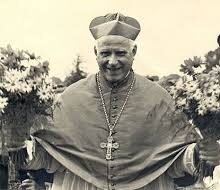The beatification of Mgr von Galen
On Sunday, October 9, 2005, in Rome, Clemens-August von Galen (1878–1946), count and bishop of Münster (North Rhineland-Westphalia), was beatified. On this occasion, French journalist Henri Tincq wrote: “Attending the event himself, an exceptional gesture for a Pope, Benedict XVI praised his ‘heroic courage’ to defend ‘the rights of God, of the Church and of man, which the Nazi regime violated in the name of an aberrant neo-pagan ideology’” (Le Monde, October 12, 2005, p. 3). H. Tincq, who always tends to practise the one-upmanship in fashion, did not fail to close his article with the following remark:
The tribute paid to him in Rome is not being challenged, but historians remind us that, if the bishop of Münster did give his famous sermons against the Hitler regime, von Galen was not a member of the resistance to Nazism from the very start.
Let us first rectify one point: this “neo-pagan ideology”, as our journalist calls it, may well have been that of some National Socialist circles but Adolf Hitler, for his part, did not share it at all. Next let us add that the “Hitler regime” tolerated all the sermons of the “Lion of Münster” and did not mete out a single day’s imprisonment to him. The said regime doubtless feared that, in the event of a sanction, it might arouse the disapproval of part of the German population. A fact which leads some to point out that, in the field of tolerance in matters of religion as in other domains, there was no comparison between, on the one hand, the Hitler dictatorship and, on the other hand, the Stalinist dictatorship, supported by the great Democracies.
What the reporter from Le Monde failed to recall to his readers is that after the defeat of the Third Reich Mgr von Galen spoke out vigorously against the appalling acts perpetrated by his country’s “liberators”. He did so as early as July 1st, 1945, during a pilgrimage of Münster diocesans. On that occasion he denounced “the ransacking of our homes destroyed by bombs”, “the pillaging and destruction of our houses and farms in the countryside by armed bands of robbers”, the “murder of defenceless men”, “the rape of German women and girls by bestial lechers”, the indifference of the occupation forces to the risk of famine in Germany, all these horrors finding justification on the basis of “the false view that all Germans are criminals and deserve the most severe punishment, including death and extermination!” (ja Tod und Ausrottung!).
That sermon is quoted in a tribute to Mgr. von Galen written by Dr Alfred Schickel, director of the Zeitgeschichtliche Forschungsstelle (Centre for research in contemporary history) of Ingolstadt, where the full text is archived. The tribute is entitled “Ein furchtloser Kirchenmann und Anwalt seines Volkes” (A fearless churchman and defender of his people).
October 7, 2005

